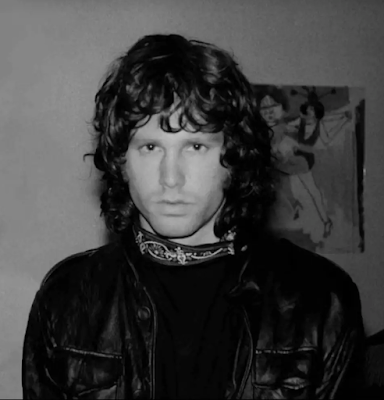THE DOORS' "RIDERS ON THE STORM": JIM MORRISON'S VOCALS
The last vocal track recorded by Jim Morrison is the one we can hear in “Riders
On The Storm”, the closing track on The Doors’ sixth album, L.A. Woman
(recorded between late 1970 and early 1971).
In fact, shortly before the LP's release, the frontman left Los Angeles
for Paris and tragically died in the French capital in early July 1971.
The different musical facets of “Riders On The Storm”
(just over seven minutes in length) have been reviewed on this blog in four
in-depth articles: the role of Robby Krieger's guitar (link here); Ray
Manzarek's electric piano and his solo (link here); the electric bass
and drums (link here); the studio effect that immerses the arrangement
in a storm (link here).
In this article, we will analyze the last sonic element yet to be explored:
Jim Morrison's lead vocals, along with the words he conveys with dark
intensity.
The vocal line of this composition grows stronger as it unfolds through the
song’s structure: a verse, bridge and chorus sequence which is repeated four
times).
During this progression, however, the singing remains within the boundaries
of a measured energy and a heartfelt, solemn intonation.
In this way, the singer narrates the profound thoughts expressed in the
verses as though they were a voice-over, rather than showing emotional
involvement experienced firsthand.
Morrison's poetry is sung with a resigned yet uneasy cadence, like a
rock litany floating imperturbably on rhythmic accents full of bitter
awareness.
The timbre of the vocals is tinged with dark hues and enigmatic shadows,
blending with the restless, mysterious atmosphere evoked by the dialogue between
the instruments.
The contours of Morrison's voice are slightly softened by a subtle
reverb, achieved by singing in a recording room dedicated to this very purpose.
In early 1971, a second vocal track was added, marking the final musical
contribution of The Doors’ frontman. It consists of an ethereal whisper that
overlaps exactly with the original singing, as though Morrison's ghost joined
him on vocals before accompanying the twenty-seven years old singer to his
grave.
Together, the two vocal tracks evoke a subtle sense of apprehension, making
the song's words appear like a secret message from another dimension.
Morrison's verses offer intriguing philosophical and existential
insights that align perfectly with the dark dynamism of the music.
His thoughts prompt listeners to reflect on some unusual and sometimes
disturbing aspects of reality that are often overlooked in everyday life.
The main theme expressed in the lyrics is reiterated in both the first
and fourth verse-bridge-chorus sequences (from 0:45 to 1:10 and from 5:02 to
5:27, respectively).
A fatalistic conception makes its way through these verses, expressing
the dissatisfaction and brevity that characterize human existence (“Into
this house we’re born / Into this world we’re thrown / Like a dog without a
bone / An actor out on loan”).
These effective metaphors depict life as a current, symbolized by the
song's title, which carries human beings along a path of frustrations,
setbacks, and dangers.
The second verse-bridge-chorus succession (from min. 1:13 to min. 1:39)
reinforces the concept of uncertainty and risk inherent in each of our personal
lives.
Here, the concise and distressing tale of a family about to give a ride
to a serial killer is vividly described through some sinister details: “His
brain is squirming like a toad” and “If you give this man a ride / Sweet family
will die”.
However, the third verse-bridge-chorus sequence (from min. 2:14 to min.
2:40) offers a glimmer of hope in this otherwise gloomy scenario.
In it, a woman is given the dual task of enlightening man's conscience
through patient love, and helping him to overcome the limitations imposed by
the brevity of life (“Girl you gotta love your man / Take him by the hand /
Make him understand / The world on you depends / Our life will never end”).
The coda of the composition (from min. 5:30 to the end of the song) is
punctuated by Morrison repeating the title of the tune four times: “Riders
On The Storm”.
As the arrangement approaches its conclusion, these final words fade
away like a sad and evanescent prophecy: we chase ephemeral goals, we are exposed
to incessant threats and forced to take continuous risks. We are all “Riders
On The Storm”.
Morrison created a shrewd, poetic and musical architecture for “Riders
On The Storm”. By combining his pen and voice, he strikes an exciting balance
between the sense of oppressive precariousness implied by the lyrics and the
melancholic austerity that transpires from the singing.
The musician gifts us with yet another outstanding vocal performance
(unfortunately, his last), remarkably complemented by some of the most
conceptually elevated verses in The Doors’ entire discography.
My book "The Doors Through Strange Days"- The most comprehensive journey ever made through The Doors' second LP, is available on Amazon.com, .uk, .it, .mx, .ca, etc.
Here’s a link:




Comments
Post a Comment